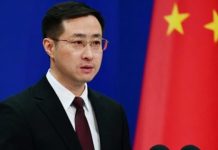By Ali Imran
ISLAMABAD: The Supreme Court on Monday announced it was suspending hearing of all high-court cases related to under-trail prisoners amid the coronavirus outbreak in the country.
The top-court also barred the high courts and the provincial governments from passing any order regarding release of prisoners. The Supreme Court also suspended the operation of Islamabad High Court orders regarding the release of under trial prisoners.
In a notice to the federal government, advocates, IG Islamabad, provincial home secretaries, IG jails and prosecutor general of the National Accountability Bureau ordered the hearing of any under-trial prisoners. During today’s hearing, Chief Justice of Pakistan Justice Gulzar Ahmed questioned under what pretence did the IHC give orders to release the prisoners.
“How can the high courts take a suo-motu notice,” CJP Gulzar remarked regarding a decision by the IHC on March 26, ordering the release of 24 under-trial suspects named in NAB references. The orders were issued in the wake of the spread of the novel coronavirus in the country. IHC Chief Justice Athar Minallah issued the orders.
The accountability bureau had contested the decision, with an additional prosecutor of the bureau asking the court to arrange for coronavirus testing of the suspects on an immediate basis.
“Why do you want to keep under-trial suspects in detention? What if the virus spreads to other prisoners while the test results are awaited? Who will be responsible?” the IHC chief justice had asked the prosecutor. “Under trial, suspects are considered innocent until the trial has concluded,” IHC CJ Minallah said in his remarks. He advised the prosecution to build up solid cases against suspects and provide evidence in court.
“The maximum penalty in these cases is imprisonment of up to 14 years, not the death penalty. Unfortunately, the courts are having to do the work that the executive should be doing,” he added. A five-judge bench, comprising Chief Justice Gulzar Ahmed, Justice Umar Ata Bandial, Justice Mazhar Alam Khan Miankhel, Justice Sajjad Ali Shah and Justice Qazi Muhammad Amin Ahmed, was hearing an appeal challenging the exercise of suo motu powers by the Islamabad High Court regarding granting bail to under-trial prisoners.
On March 20, IHC had ordered release of under-trial prisoners detained in Rawalpindi’s overcrowded Adiala jail in minor crimes and directed the Islamabad police not to make arrest in petty matters. During today’s proceedings, the additional attorney general said that the high courts are giving different rulings regarding the release of prisoners. He asked the SC to decide the matter.
The CJP questioned how the high courts could have ordered the release of under-trial prisoners. “Coronavirus is a grave matter. Under what pretence did the IHC issue the directives for releasing the prisoners?”
“How can a high court take suo motu notice in this regard?” the CJP asked. Those involved in petty crimes should be released, but the IHC has ordered for the release of all prisoners except those charged with terrorism, he said.
It cannot happen that people start making decisions which are not within their jurisdiction during a crisis, the CJP said, adding that those prisoners who have two to three months left in their sentences should be released.
He added that everybody was aware of the current situation in the country. Therefore, the release of prisoners involved in serious crimes cannot be allowed because of a coronavirus scare, he said.
The apex court adjourned the hearing until April 8 and issued notices to the federal government, all advocate generals, provincial home secretaries, Islamabad IG, the National Accountability Bureau prosecutor general and the IG jails.
Syed Nayab Hassan Gardezi had moved the six-page appeal before the Supreme Court on behalf of Raja Muhammad Nadeem, questioning whether the IHC had any jurisdiction to exercise suo motu powers.
The appeal had pleaded that the March 20 IHC order militated against the concept of trichotomy of powers since it was within the exclusive domain of the executive to frame any policy to deal with under-trial prisoners in a manner it deemed appropriate keeping in view the coronavirus emergency.




